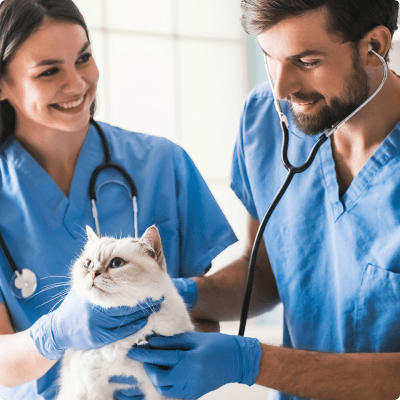BVSc Full Form is Bachelor of Veterinary Science which is an undergraduate course in the field of veterinary science. This is a 5 year course. According to the latest guidelines from the Veterinary Council of India, BVSc course duration should be of 5.5 years divided into 10 semesters and 1 year of compulsory internship.
What is Veterinary science?
Veterinary medicine is a branch of medicine that deals with prevention, management, diagnosis and treatment of disease, disorder and injury in animals. Along with this, it deals with animal rearing, husbandry, breeding, research on nutrition and product development.
BVSc is a course that provides the knowledge required for nourishment, treatment, and breeding of animals. Students who are animal lovers and want to work or own an animal breeding and caring firm and want to establish a career in animal husbandry select this course. They specialise in medicinal or surgical treatment or both to treat them. Further, they can opt for roles such as veterinary consultant, veterinary surgeon, veterinary assistant, veterinary technologist and other related roles.
BVSc ADMISSION
BVSc admission is done through NEET UG scores which is conducted annually in the month of May in offline mode. For more information about the exam refer to NEET-UG overview.
- It is a Multiple-Choice Question based exam which is conducted in offline mode.
- The question paper comprises of total 200 questions out of which students have to attempt 180 questions of their own choice.
- There are 3 main subjects (Physics, Chemistry, Biology) which are further divided into sections.
The marking scheme is +4 for correct answers and -1 for incorrect answers. Veterinary Council of India is responsible for admission counselling and process into BVSc course.
BVSc ELIGIBILITY
- The minimum age of applicant must be 17 years as of 31 December 2023.
- The upper limit is 25 years as on May 5 with an exemption of 5 years for SC/ST/OBC.
- Applicant must have pursued Physics, Chemistry, Biology as their subjects in 12 and passed with 50% in each subject.
- Applicant must have completed their 12th or will be completing 12th by 2023 from a recognized board or open school.
- Applicants must be a citizen of India, Non-Resident of India, Person of Indian Origin or Foreign National.
- The admissions are given on the basis of merit and the cutoff decided for that particular year.
OTHER ENTRANCE EXAMS FOR ADMISSIONS:
- AAU VET: Assam Agricultural University Bachelor of Veterinary Science conducted in the month of September.
- OUAT: Orissa University of Agriculture & Technology conducted in the month of July.
- RPVT: Rajasthan University of Veterinary and Animal Sciences conducted in the month of September.
- AIEEA: Indian Council of Agricultural Research All India Entrance Examination for Admission. A national level entrance exam conducted in the month of July for admissions in national universities.
BVSc TOP COLLEGES IN INDIA
- Govind Ballabh pant University of Agriculture and Technology
- Anand Agriculture University
- Tamil Nadu Veterinary and Animal Sciences
- Junagadh Agriculture University
- Orissa University of Agriculture Technology
- Indian Veterinary Research Institute
BVSc CURRICULUM
The whole course is divided in 10 semesters with various subjects of practicals and theory sessions. Training in animal treatment and care are also included.
Basic subjects in the course are:
- Veterinary anatomy
- Veterinary biochemistry
- Veterinary parasitology
- Veterinary pathology
- Animal nutrition
- Livestock production management
- Veterinary gynaecology and obstetrics
- Veterinary pharmacology
- Veterinary microbiology
- Animal genetics and breeding
- Veterinary surgery and radiology
- Animal husbandry
COURSES AFTER BVSc
- Public services: Medical graduates can also apply for public services like IAS, IPS, IFS etc.
- Public Health: Many students opt for Masters in Public Health which deals with epidemiology, Healthcare management biostatistics etc.
- MBA in Hospital Administration: the graduates who are interested in management related career opt for MBA.
- MVSc: Graduates can pursue higher studies and choose various specialisations by choosing masters in Veterinary sciences. It is a two year course
COURSES AFTER BVSc
- Public services: Medical graduates can also apply for public services like IAS, IPS, IFS etc.
- Public Health: Many students opt for Masters in Public Health which deals with epidemiology, Healthcare management biostatistics etc.
- MBA in Hospital Administration: the graduates who are interested in management related career opt for MBA.
- MVSc: Graduates can pursue higher studies and choose various specialisations by choosing masters in Veterinary sciences. It is a two year course
Various specialisations are:
- MVSc in Veterinary Parasitology
- MVSc in Veterinary Biochemistry
- MVSc in Veterinary Pharmacology and toxicology
- MVSc in Veterinary Microbiology
- MVSc in Animal Genetics and breeding
- MVSc in Veterinary Surgery and Radiology
- MVSc in Animal Nutrition
- PhD: The highest degree one can obtain is PhD in Veterinary Sciences. It is the highest paid specialisation in this sector.
JOBS AFTER BVSc
- Veterinary Officer: Graduates can apply for the post of Veterinary officer in government hospitals and offices. They work to keep a check on the rules and regulations for animal healthcare.
- Animal caretaker: They provide care and treatment to animals.
- Animal care specialist: They provide specialised care to particular breeds of animals.
- Animal breeder: They take care of the breeding patterns, seasons and compatibility of breeding among animals. They also perform different types of breeding to form hybrid species for the maximum productivity of animals.
Nowadays animal breeding is gaining a lot of importance because of the production of more efficient hybrids.
- Animal scientist: They research domestic and farm animals about their lifestyle patterns and feeding habits. Then make alterations in those patterns to increase their lifespan, food productivity and to prevent diseases.
- Veterinary surgeon: They perform surgeries, treat wounds around joints and muscles in animals.
SCOPE OF BVSc
- State Government sector
- Nationalised sector
- Academic research
- Municipal or panchayat officer
- Self-employment
- Private hospitals/clinics

